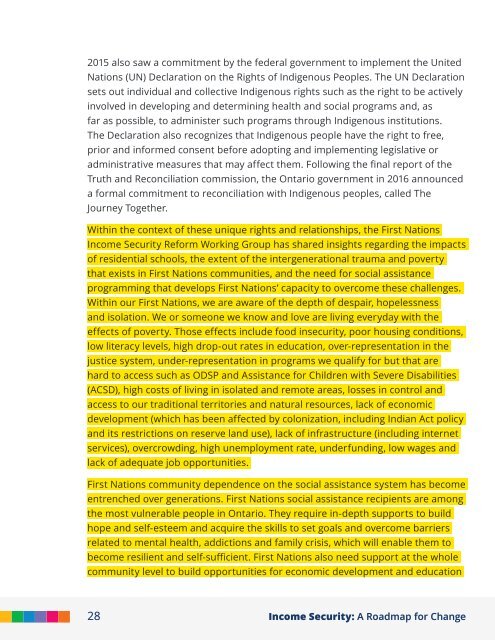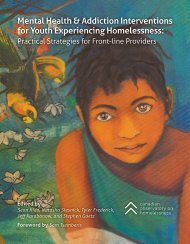Income Security: A Roadmap for Change
Create successful ePaper yourself
Turn your PDF publications into a flip-book with our unique Google optimized e-Paper software.
2015 also saw a commitment by the federal government to implement the United<br />
Nations (UN) Declaration on the Rights of Indigenous Peoples The UN Declaration<br />
sets out individual and collective Indigenous rights such as the right to be actively<br />
involved in developing and determining health and social programs and, as<br />
far as possible, to administer such programs through Indigenous institutions<br />
The Declaration also recognizes that Indigenous people have the right to free,<br />
prior and in<strong>for</strong>med consent be<strong>for</strong>e adopting and implementing legislative or<br />
administrative measures that may affect them. Following the final report of the<br />
Truth and Reconciliation commission, the Ontario government in 2016 announced<br />
a <strong>for</strong>mal commitment to reconciliation with Indigenous peoples, called The<br />
Journey Together<br />
Within the context of these unique rights and relationships, the First Nations<br />
<strong>Income</strong> <strong>Security</strong> Re<strong>for</strong>m Working Group has shared insights regarding the impacts<br />
of residential schools, the extent of the intergenerational trauma and poverty<br />
that exists in First Nations communities, and the need <strong>for</strong> social assistance<br />
programming that develops First Nations’ capacity to overcome these challenges<br />
Within our First Nations, we are aware of the depth of despair, hopelessness<br />
and isolation We or someone we know and love are living everyday with the<br />
effects of poverty Those effects include food insecurity, poor housing conditions,<br />
low literacy levels, high drop-out rates in education, over-representation in the<br />
justice system, under-representation in programs we qualify <strong>for</strong> but that are<br />
hard to access such as ODSP and Assistance <strong>for</strong> Children with Severe Disabilities<br />
(ACSD), high costs of living in isolated and remote areas, losses in control and<br />
access to our traditional territories and natural resources, lack of economic<br />
development (which has been affected by colonization, including Indian Act policy<br />
and its restrictions on reserve land use), lack of infrastructure (including internet<br />
services), overcrowding, high unemployment rate, underfunding, low wages and<br />
lack of adequate job opportunities<br />
First Nations community dependence on the social assistance system has become<br />
entrenched over generations First Nations social assistance recipients are among<br />
the most vulnerable people in Ontario They require in-depth supports to build<br />
hope and self-esteem and acquire the skills to set goals and overcome barriers<br />
related to mental health, addictions and family crisis, which will enable them to<br />
become resilient and self-suffcient. First Nations also need support at the whole<br />
community level to build opportunities <strong>for</strong> economic development and education<br />
28 <strong>Income</strong> <strong>Security</strong>: A <strong>Roadmap</strong> <strong>for</strong> <strong>Change</strong>
















